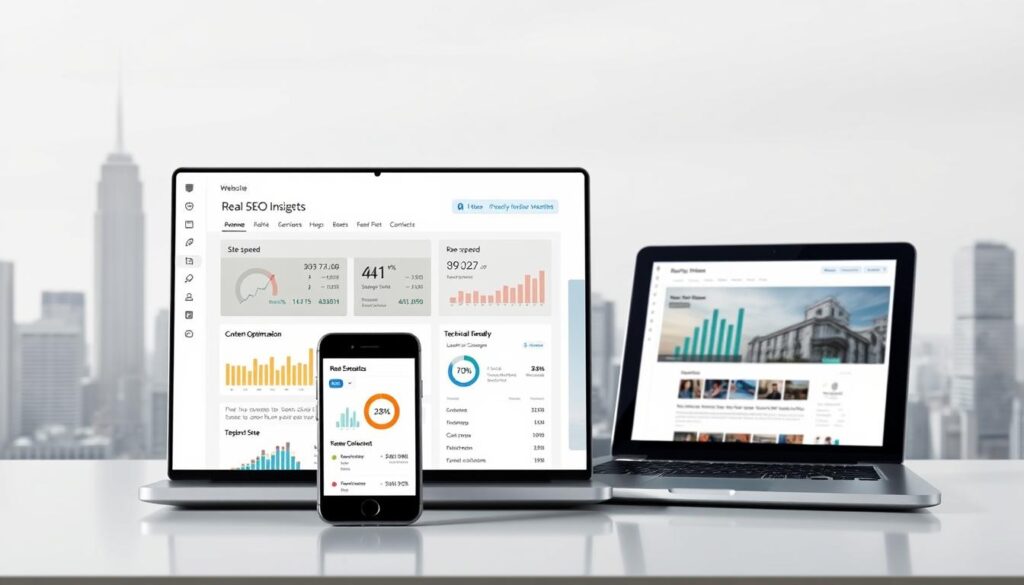As a real estate pro, I know how key a strong online presence is. Today, effective SEO strategies are vital for drawing in clients and staying competitive.
Real estate marketing has changed a lot. A good SEO plan can greatly improve your business. By making your website and content better, you can get more people to see you, drive more traffic, and increase sales.
In this article, I’ll share top SEO strategies to boost your online presence and attract more clients. By using these strategies, you can elevate your real estate business.
Key Takeaways
- Understanding the importance of SEO in real estate marketing
- Learning effective SEO strategies for your business
- Discovering ways to enhance your online presence
- Attracting more clients and boosting sales
- Staying ahead of the competition with SEO
The Digital Transformation of Real Estate Marketing
Online search is now key in the real estate world. Having a strong digital presence is vital for success. The real estate industry has moved online, making it key for professionals to update their marketing.
How Online Search Has Changed Property Hunting
Online search has changed how people find properties. Now, buyers start online, using search engines for property listings. Real estate agents must make their listings stand out online to attract clients.
The Competitive Advantage of Digital Visibility
A strong online presence gives real estate professionals an edge. By optimizing for local search, they can attract more clients. This means using the right keywords, creating quality content, and making their website easy to use.
SEO for Real Estate Business: The Fundamentals
To stay ahead in the competitive real estate market, it’s essential to grasp the basics of SEO and its applications. Effective SEO strategies can significantly enhance your online visibility. They drive more qualified leads and ultimately boost your real estate business.
How Search Engines Evaluate Property Websites
Search engines like Google use complex algorithms to evaluate and rank property websites. These algorithms assess various factors, including keyword relevance, site speed, and mobile responsiveness. Ensuring your website is optimized for these factors is key for improving your search engine rankings.
Critical SEO Metrics for Real Estate Success
To measure the success of your SEO efforts, you need to track key metrics. These include organic traffic, keyword rankings, and conversion rates. By monitoring these metrics, you can identify areas for improvement. Then, adjust your SEO strategies to better meet your goals.
Dominating Local Search Results
In today’s digital world, dominating local search is key for real estate pros. More people use online searches to find homes and services. So, having a solid local SEO plan is essential.
Optimizing Google Business Profile for Realtors
Start by optimizing your Google Business Profile. Claim your listing and make sure your NAP (name, address, phone number) is right. Add good photos and detailed service descriptions. Keep your profile fresh with updates and quick review responses to get noticed.
Creating Neighborhood-Specific Landing Pages
Make pages for each neighborhood you serve. Use local keywords to draw in search traffic. Share content that meets local buyers’ and sellers’ needs to engage them.
Building Local Citations and Backlinks
Building local citations and backlinks boosts your site’s authority and search rankings. Here’s how:
- Directory listings
- Local business associations
- Partnerships with local businesses
Directory Listings That Matter for Realtors
Being listed in top directories can help your local SEO. Choose directories that matter to real estate and have a strong local focus.
Earning Links from Local Businesses
Getting links from local businesses boosts your site’s authority and builds community ties. Work with local businesses on content or events to get these valuable links.
Strategic Keyword Research for Property Listings
Strategic keyword research can greatly improve the online visibility of property listings. It helps drive more leads to real estate businesses. In today’s competitive real estate market, knowing how to use keywords well is key for agents and developers.
Identifying High-Intent Real Estate Search Terms
To make the most of keyword research, find high-intent search terms. These are the terms people use when they’re serious about finding properties. They often include location, property type, and specific amenities.
- Location-based keywords (e.g., “homes for sale in [city]”)
- Property type keywords (e.g., “luxury condos”)
- Amenity-specific keywords (e.g., “properties with pool”)
Tools for Real Estate Keyword Discovery
Several tools can help find real estate keywords. These include:
- Google Keyword Planner
- Ahrefs Keyword Explorer
- SEMrush
These tools help find relevant keywords. They also show search volume and competition levels.
Analyzing Competitor Keyword Strategies
Looking at what your competitors use for keywords can be very helpful. It shows what works and what doesn’t in your area. By seeing what keywords your competitors use, you can find gaps and opportunities.

Implementing Location-Based Keywords
Using location-based keywords is vital for real estate SEO. It helps your listings show up in local searches. This means using city names, neighborhood names, and other geographic details in your keywords.
Tips for effective location-based keyword implementation:
- Use long-tail keywords that include specific locations (e.g., “apartments for rent in downtown [city]”)
- Optimize your website’s meta tags and content with location-based keywords
- Create location-specific landing pages for different neighborhoods or areas you serve
Creating Compelling Property Content That Ranks
As a real estate pro, I know how key it is to make engaging property content. This content must appeal to both buyers and search engines. In today’s digital world, having a strong online presence is vital for attracting leads and boosting sales.
Writing SEO-Optimized Property Descriptions
Property listings’ descriptions are critical. They can either sell a property or not. To craft SEO-optimized property descriptions, use keywords buyers might search for. Describe the property’s best features in a way that grabs attention. Include details like bedrooms, bathrooms, square footage, and amenities.
For instance, instead of saying “beautiful home,” say “a stunning 4-bedroom colonial with a spacious backyard.” This approach paints a clear picture and uses keywords to boost search rankings.
Image and Virtual Tour Optimization Techniques
Visual elements are also key in showing off properties. Optimizing images and virtual tours can enhance the user experience and improve rankings. Use descriptive file names and alt tags with target keywords, like “modern-kitchen-with-stainless-steel-appliances.jpg.”
Make sure virtual tours are high-quality, interactive, and easy to use. This helps buyers see the property and keeps them engaged, reducing bounce rates.
Developing Value-Added Content Assets
Creating value-added content assets can boost your real estate market standing. This includes neighborhood guides, market reports, and resources for buyers and sellers.
Neighborhood Guides and Market Reports
Neighborhood guides offer insights into local schools, amenities, and events. They’re a great resource for buyers. Market reports, with their data-driven analysis, help buyers and sellers make smart choices.
Buyer and Seller Resources
Offering resources like checklists, FAQs, and educational content builds trust and shows your expertise. By sharing valuable info, you attract clients and stand out as a trusted real estate expert.
Technical SEO Essentials for Real Estate Websites
Technical SEO is vital for real estate websites to be seen more. A well-optimized site boosts search rankings and makes browsing easier for visitors.
Mobile-First Optimization for Property Searches
Most people search for properties on their phones. So, making your site mobile-friendly is essential. It should be easy to use and quick to load on smaller screens.
Key aspects of mobile-first optimization include:
- Responsive design that adapts to various screen sizes
- Fast loading speeds to reduce bounce rates
- Easy navigation and clear calls-to-action
Page Speed Enhancements for Better User Experience
Page speed affects both user satisfaction and search rankings. Slow sites can cause people to leave quickly, hurting sales.
To make your site faster, try:
- Optimizing images and compressing files
- Leveraging browser caching and content delivery networks (CDNs)
- Minimizing HTTP requests and reducing server response times
Implementing Real Estate Schema Markup
Schema markup gives search engines more info about your site. For real estate sites, it can highlight listings and reviews.
Property Listing Structured Data
Structured data for property listings gives search engines detailed property info. This includes price, location, and features.
Review and Rating Schema
Schema markup for reviews and ratings shows off client feedback. It builds trust with future clients.

Building Authority Through Strategic Content Marketing
To stand out in the real estate market, businesses must use strategic content marketing. This method boosts online visibility and makes a brand a leader in the industry. By making valuable and relevant content, real estate pros can draw in new clients and increase engagement.
Developing a Real Estate Blog That Generates Leads
A well-made blog is key for any real estate business wanting to get leads. By sharing informative articles, market updates, and local news, realtors show they know their area well. Consistency is key; posting regularly keeps readers interested and coming back. Also, using the right keywords makes the blog easier to find online.
For example, a blog post on “Top 5 Neighborhoods to Invest in Within the Next Year” can attract investors and homebuyers. Using SEO best practices like header tags and meta descriptions makes the post easier to find.
Video SEO Strategies for Property Promotion
Video content is getting more popular in real estate marketing. Realtors can offer immersive experiences with virtual tours, property showcases, and neighborhood guides. Making video titles, descriptions, and tags keyword-rich helps them show up on YouTube.
Video SEO is more than just keywords. It’s also about making videos mobile-friendly and quick to load. This improves the viewing experience and boosts engagement.
Integrating Social Proof with SEO Efforts
Social proof, like client testimonials and case studies, is vital for credibility. Sharing success stories and happy clients builds trust with new clients. This helps in converting them and boosts SEO efforts.
Leveraging Client Testimonials
Client testimonials are strong endorsements of a realtor’s work. By using them on the website and marketing, businesses gain credibility. It’s important to get client permission and display testimonials in a clear and engaging way.
Case Studies of Successful Transactions
Case studies offer deep looks into successful deals, showing strategies and outcomes. They’re great for showing a realtor’s expertise and value. By using the right keywords, case studies become easier to find online.
Tracking and Measuring Your Real Estate SEO Success
To get the most out of your real estate SEO, tracking and measuring are key. By watching important SEO success metrics, you can make your strategies better. I look at things like organic traffic, keyword rankings, and conversion rates to see how well my marketing works.
Google Analytics and Search Console give me insights into my website’s performance. They help me find what needs work. By using this data, I can tweak my SEO to reach more people and get more leads. This way, I can make my content better and climb the search engine ranks, leading to more sales and money.
Keeping an eye on my SEO and making changes as needed helps me stay ahead. It’s all about having a strong online presence and growing my business. Tracking and measuring SEO success are vital for success in real estate marketing.










